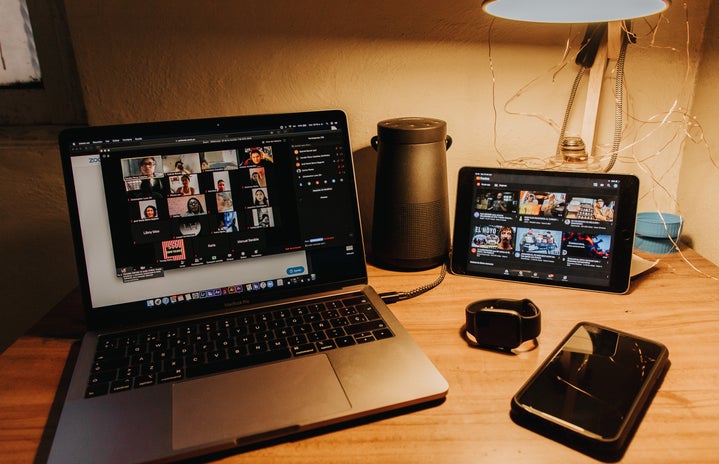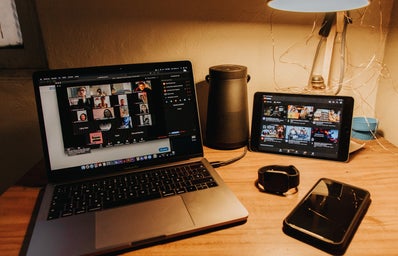Eat. Drink. Sleep. Zoom. For many of us, Zoom has been integrated into our lives like any other necessity. If you have been attending classes this year or working from home, you most likely have been exposed to this video conferencing medium and mastered the ins-and-outs of it. It’s evident the pandemic has changed the way we communicate; with the ability to link-up remotely, Zoom is going to be around for quite some time.
By now, we have all heard the phrase “Zoom fatigue” circling around and it’s most certainly real. There are particular causes for the mental drainage we have all been experiencing due to the platform. It’s not to say that Zoom isn’t beneficial (it is undoubtedly a useful tool) but like anything else, too much exposure can be unhealthy. Luckily, as Zoom users, we have the power to minimize the effects of “Zoom fatigue.”
Zoom is a stimulus overload. You have a gallery view of dozens if not hundreds of participants, hosts sharing screens, the ones who forget to mute themselves when they’re not speaking and of course, the ones who constantly change their background to be anywhere but “here.” There’s a lot going on. It’s no surprise you may be feeling lethargic halfway through a call.
In recent studies conducted by Stanford University under Communication Professor Jermey Bailenson, Bailenson states in regular face-to-face interactions, nonverbal communication is natural and each of us naturally makes and interprets these gestures subconsciously. But on Zoom, we have to work much harder to send and receive these signals so they get noticed. Motions such as head-nodding to display agreement with the speaker have to be over-exaggerated, which Bailenson says requires a lot of mental calories just to communicate.
As well, gestures can be misinterpreted online. For instance, someone looking away from the screen, even to break eye-contact for a split second may appear to be uninterested in the topic meanwhile they might be keeping an eye on their child. Because none of us are physically in anyone’s environment, we don’t know what’s happening in their surroundings. All of us are looking at everyone’s body signals constantly, some of which may have meaning while others may not.
One solution Bailenson provided is to give yourself an “audio-break.” “This is not simply you turning off your camera to take a break from having to be nonverbally active, but also turning your body away from the screen,” said Bailenson, “so that for a few minutes you are not smothered with gestures that are perceptually realistic but socially meaningless.”

Another thing to note, the extensive amount of eye-contact and the close proximity of faces on Zoom are far greater than in a natural setting. “What’s happening, in effect, when you’re using Zoom for many, many hours is you’re in this hyper-aroused state,” Bailenson stated. In a real-world situation, when we are inches away from another person’s face, we can perceive them as a threat and as violating our personal space, making us uncomfortable.
Taking Zoom out of full-screen and minimizing the size of other participant’s windows is a great way to cope with this. As well, if you’re able to move your camera back or use an external keyboard to create distance from you and other participants so they’re not as close could help too.
Another cause for “Zoom fatigue” is that we spend an excessive amount of time looking at ourselves in our own little video box, but in a real-world context, whether it be in class or a work meeting, we can’t see our reflections … unless of course, we’re walking around with a mirror. There have been studies that showcase that when we see our reflection we become more critical of ourselves. We become consumed with the way we look and how we are presenting ourselves on screen, which can make us even more stressed. Thus, it is recommended to hide self-view once you have positioned yourself in the frame, this way everyone can see you but you won’t be distracted by your own reflection.


If you’re interested in further reading about Professor Bailenson’s and Stanford’s findings, visit https://news.stanford.edu/2021/02/23/four-causes-zoom-fatigue-solutions



